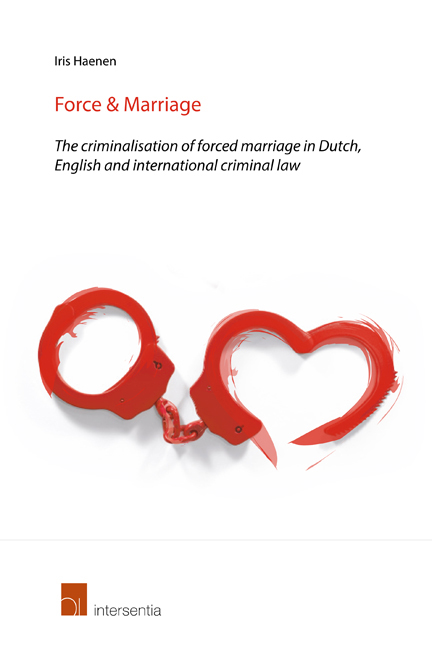 Force & Marriage
Force & Marriage Book contents
- Frontmatter
- Acknowledgements
- Contents
- Abbreviations
- General introduction
- PART I FORCE AND MARRIAGE: Description and definition of forced marriage
- Chapter 1 Consensus facit nuptias
- Chapter 2 Forced marriages in the Netherlands and England
- Chapter 3 Forced marriages in conflict situations
- PART II A TALE OF TWO THEORIES: Criminalisation on the level of national law and international law
- PART III THE LAW AND FORCED MARRIAGE: Legal frameworks concerning forced marriage in Dutch, English and international criminal law
- PART IV ANALYSIS AND CONCLUSIONS
- Summary
- Bibliography
- Table of cases
- Curriculum vitae
- Index
Chapter 2 - Forced marriages in the Netherlands and England
from PART I - FORCE AND MARRIAGE: Description and definition of forced marriage
Published online by Cambridge University Press: 22 November 2017
- Frontmatter
- Acknowledgements
- Contents
- Abbreviations
- General introduction
- PART I FORCE AND MARRIAGE: Description and definition of forced marriage
- Chapter 1 Consensus facit nuptias
- Chapter 2 Forced marriages in the Netherlands and England
- Chapter 3 Forced marriages in conflict situations
- PART II A TALE OF TWO THEORIES: Criminalisation on the level of national law and international law
- PART III THE LAW AND FORCED MARRIAGE: Legal frameworks concerning forced marriage in Dutch, English and international criminal law
- PART IV ANALYSIS AND CONCLUSIONS
- Summary
- Bibliography
- Table of cases
- Curriculum vitae
- Index
Summary
INTRODUCTION
The practice of forced marriage is not something that is generally associated with Western Europe. Often, it is assumed that this only happens in ‘other’ countries. Yet research shows that forced marriages are a daily reality in Europe. In England, the majority of forced marriages take place in Indian, Pakistani and Bangladeshi communities; in the Netherlands, Moroccan, Turkish and Surinamese Hindustani communities are mostly associated with the practice. Granted, the bulk of forced marriages are contracted in migrant communities, but as was discussed in Chapter 1 and will be demonstrated below, forced marriages are not foreign to traditional Dutch and English communities either: they also take place in orthodox Protestant and strict Catholic circles.
In order to get a clear picture of the practice of forced marriage, this chapter describes forced marriages as they occur in the Netherlands and England, focusing on prevalence, victims, perpetrators, key motivations and consequences. As was stated in the previous chapter, this research defines ‘forced marriage’ as a marriage at least one of the partners entered into against their will as a result of some form of coercion exerted by another person.
FORCED MARRIAGE IN THE NETHERLANDS
PREVALENCE
Forced marriage is a hidden phenomenon that is difficult to quantify. Most known and alleged cases of forced marriage take place within the context of the families of the spouses. Often, they become visible only after the situation has escalated and has resulted in domestic or honour-related violence. Anthropologists, legal researchers and law enforcement professionals have noted that victims of forced marriage are reluctant to go to the police, as this could compromise their relationship with their family and community. As a result of these complicating factors, and because neither the police nor the Public Prosecution Service (PPS) specifically registers cases of forced marriage, there are no exact figures on the prevalence of this practice in the Netherlands.
- Type
- Chapter
- Information
- Force & MarriageThe criminalisation of forced marriage in Dutch, English and international criminal law, pp. 47 - 64Publisher: IntersentiaPrint publication year: 2014


